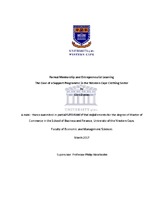Formal mentorship and entrepreneurial learning: The case of a support programme in the Western Cape clothing sector
Abstract
How entrepreneurs learn to cope and survive in the South African clothing sector, with its high levels of
macro-environment turbulence, may engender particular lessons for entrepreneurial learning and related
outcomes such as business innovation. Although SME support measures worldwide offer mentorship to
assist firm survival and growth, little is known about how entrepreneurs learn under the guidance of a
mentor. Formal mentorship is employed with increased frequency as a training intervention suited to
entrepreneurs. Entrepreneurial learning is linked to experiential learning in the personal development of
the entrepreneur and development of the business venture. Formal mentorship as a medium to enhance
entrepreneurial learning is the focus of this study.
Past research does not adequately address entrepreneurial learning in the context of prolonged turbulent
competitive environments, and the role of formal mentorship as a significant contributor to
entrepreneurial learning. This qualitative case study is set within the clothing industry of the Western
Cape, which is affected by high levels of competitive turbulence. Entrepreneurs and their mentor's
accounts are collected through unstructured and semi-structured personal interviews and analysed using
thematic analysis. The mentors are contracted to an organisation that provides business development
support to SMEs within the clothing sector. Key participants within this organisation, and their sponsor,
are interviewed to study strategic influences on formal mentorship. This constitutes the case and a
purposive-snowball sampling strategy was employed.
The research shows how strategic sponsorship agreements influence the functions and roles that mentors
adopt within a top-down approach to mentoring. While formal mentorship provides a valuable
intervention as a training mechanism in the SME sector, a propensity for technically driven mentoring
outcomes is specific to the clothing industry case. While entrepreneurial learning is associated with
formal mentorship, it does not necessarily influence business innovation.

